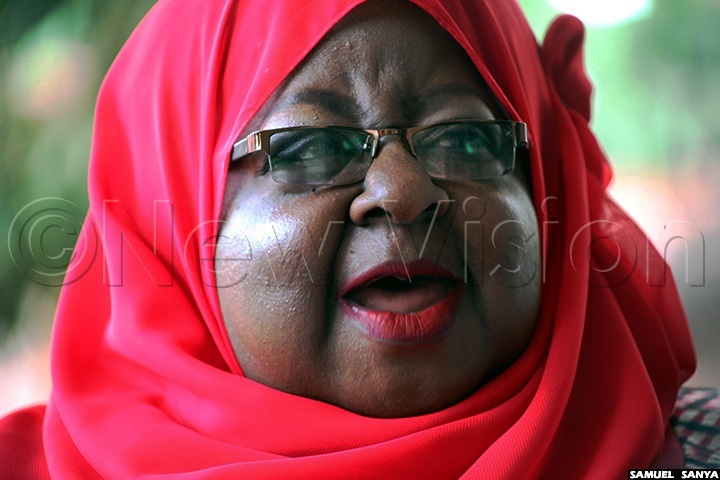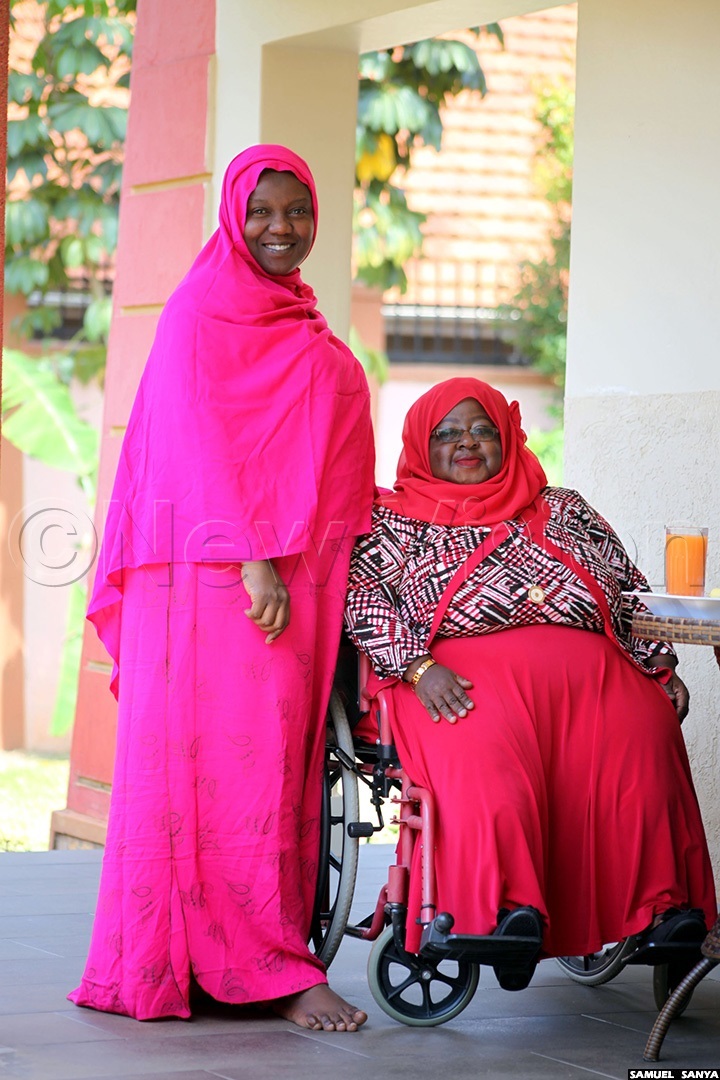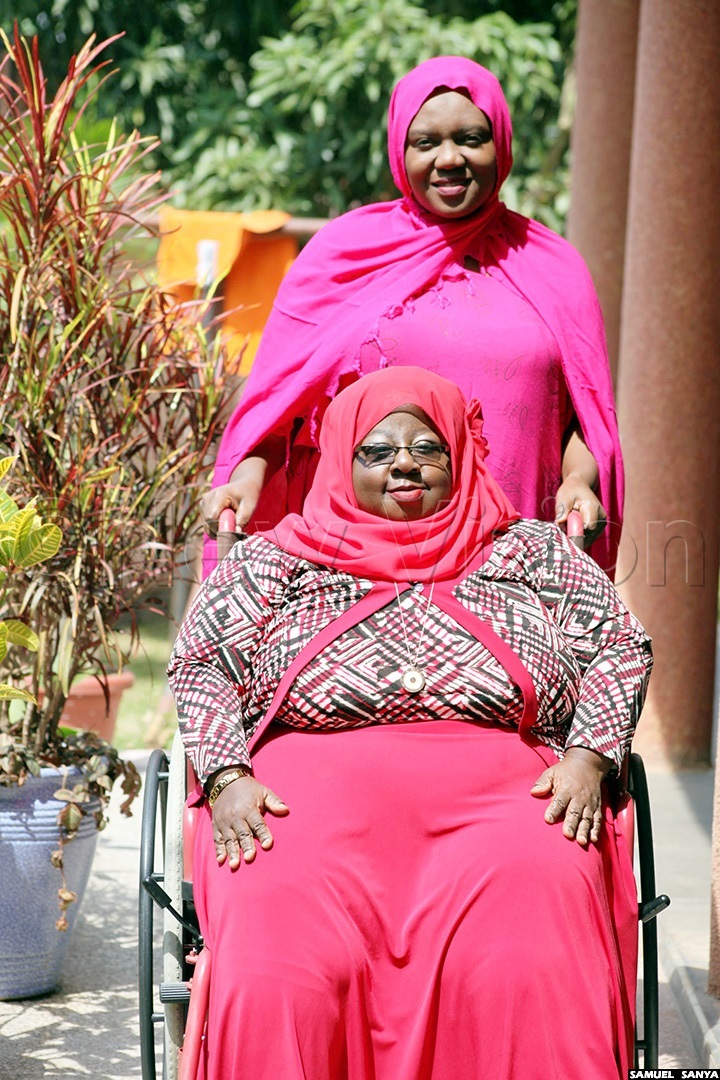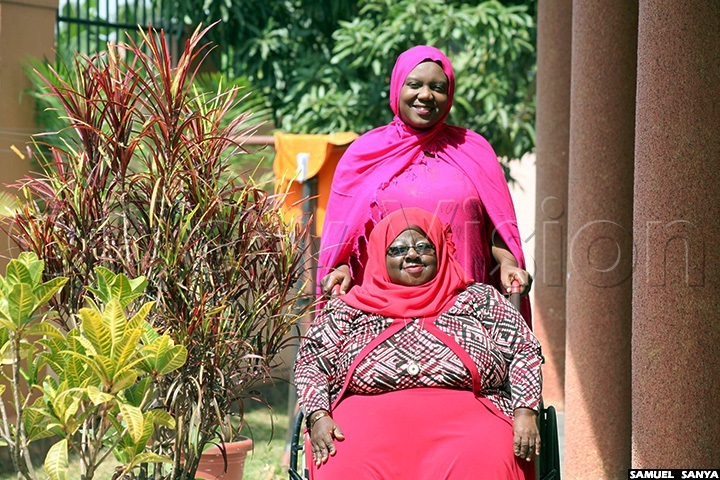Uganda is excluding its little people from social life
Namatovu is a little person, the contemporary description for what the medical world terms as dwarfism. Despite her stellar achievements, the pink wheelchair she rides in has stubbornly rained on the parade of the dwarfism awareness and inclusion advocate.
The riotous revving of car engines on the busy Ntinda-Kyanja road gives way to the soothing babble of a natural spring within Asher Namatovu's backyard.
As the heat of the mid-day sun intensifies, she sits quietly in the safety of the shade of her veranda next to a well-kempt flower garden. Garbed in a red hijab and marching lipstick - Namatovu seemingly ponders about the mystery that is life on earth.
She has taken the high road and has trodden down the same narrow corridors and pathways at Nabisunsa Girls secondary school as her better-known counterparts such as health minister Jane Ruth Aceng, Former Uganda Revenue Authority chief Doris Akol, former finance minister Syda Bbumba, beloved songstress Jackie Chandiru and Ruth Nankabirwa - the government chief whip.

Namatovu's journey has led her through Makerere University, leaving with an undergraduate degree in Quantitative Economics, a distinguished Association of Chartered Certified Accountants (ACCA) certificate and membership in the Institute of Certified Public Accountants of Uganda (ICPAU).
The 36-year-old "super aunty", entrepreneur, blogger, finance and administration head at Swift Safaris has had an above-average Ugandan life by most accounts and yet, for all her achievements, society has judged her for what she couldn't give herself - her stature.
Namatovu is a little person, the contemporary description for what the medical world terms as dwarfism. Despite her stellar achievements, the pink wheelchair she rides in has stubbornly rained on the parade of the dwarfism awareness and inclusion advocate.
"When they see a little person, most people think of the Munchkins in the Wizard of Oz, the Oompa Loompa's in Willy Wonker and the Chocolate factory, or elves in the Christmas movies; they don't think of dwarfs as real people," Namatovu says, staring me in the eye.
She lifts her glasses, wipes a tear and says; "I am more than my height. I am a woman just like any other. I have the same needs. The same wants. The same dreams. The same capabilities. My intelligence is normal or above average."
"When someone sees me, they think that there is something wrong with me. There is nothing wrong with me, I just look different. I have a challenge like everyone else."
Life as a little person in a world of giants, especially for Namatovu who has brittle bones that do not heal when broken is not all rice and gravy; it's not been plain sailing. There are over 200 different types of dwarfism.
Uganda has not been kind to its little people - there about 5,000 Ugandans with dwarfism in Uganda, according to Little People of Uganda (LPU), a support organization.
Uganda's building code requires an entry for all, but most buildings in Uganda, even the internationally acclaimed Kampala Serena hotel conference centre has stuck to its fleet of steps to exclude those that require a ramp-like Namatovu.
Very few people give much thought to little people when choosing where they place a light switch and the button on a lift, or where to place a doorknob, or how high they make the toilet seat. "How are little people expected to go to school from 8am to 5pm and not use the toilet?" is a question worth pondering.
Of course, doorknobs could be placed lower or instead of doorknobs, sliding doors could be used, light switches can also be made lower. The counters at the bank and most things that have been made for the average size person can be adjusted to fit everyone.
It only starts there. Unlike the buses abroad, Uganda's buses and taxis do not have ramps to ease life for the differently-abled and the little people and neither is there space to stack wheelchairs. Uganda's fashion world has also ignored the little people.

Namatovu says her sister helps her shop for clothing; here the challenge is that the price range in upmarket places like Acacia mall or oasis mall is beyond the affordability of people with disability and yet malls in downtown Kampala that are within range are inaccessible.
She has the same shoe size as her six-year-old niece; however, shoes for children that age are not suited for adults since they are too flowery and are childish.
"Accessibility is probably the hardest thing for me; how to open a door, how to flip a light switch, how to get into an elevator, things like that, how to get into the bathroom is a huge task,
"Society has been conditioned to think that someone like me stays home. That we do not go to school or get a job, and that we rely on handouts and someone - I am lucky to have a supportive family,
"But if you give us something to do, we can do it - for instance, I am a qualified accountant and I am good at what I do. But when society sees me, they see the lack of height and the wheelchair and by that, they determine what I can possibly do and what I cannot do," Namatovu explains.
She says that in the past, people looked at little people as entertainers, working at the circus, or in comedy; although there is nothing with doing that if that is what someone loves to do, society has boxed all little people in that element.
Growing up
Namatovu comes from a typically large Muslim family; she was the fourth child of 13 children. Her oldest brother, the family's firstborn Asuman Matovu, lovely referred to as "Martin" is also a little person at about 4ft.
"As a child, I did not suffer so much because I can from a middle-class family and I could afford the basics. Because my older brother had borne the brunt of discrimination, by the time I came along things had smoothened a little but it doesn't mean that it was easy," Namatovu points out.
She says her deceased father, who was a businessman, used to treat her specially, pampering her.
In contrast, her mother, a teacher turned politician treated her just as she would the next child and this initially boggled Namatovu as a child, but she grew to appreciate being canned and asked to do the chores that the average Ugandan child does.
"People look at people with disabilities in a pitiful way, but we do not want pity. Society, our families and ourselves - We have been made to believe that we cannot amount to much. We just need certain things to be moved around so that we can thrive," she notes.

"Parents should treat their differently-abled children like their other children otherwise it affects their self-esteem. We have that helplessness and despair because we have been made to feel like liabilities,
"Most of us do not like the way we are. We hate our lives because we have been made to feel like we are useless. Many parents feel like having a child with a disability is a punishment or a curse which is not true," Namatovu explains.
She was lucky to get a good education since the average person with disabilities in Uganda doesn't go to school. And when they go to school, it's hard to get employed because most firms bulk at the need to make adjustments to cater for the differently-abled person even when they bring enormous value.
Namatovu points out that in many instances, people with disabilities settle for jobs that they are overly qualified for like being data entrants or being research assistants at law firms instead of being the lawyer themselves.
She says that her heart was set on being a lawyer or a doctor but had to settle for a university degree that would lead to a desk job to increase the likelihood of getting employed; something she wouldn't have to consider if most professions made provisions for the people with disabilities.
She says that people with disabilities are unfairly called "bakateyamba" in the local Luganda dialect to mean they cannot help themselves.
"We have little people who are artistic; they can program or code or just do graphics. We should not be limited to selling cutex on the streets, mending shoes and begging for people to help us,
"If we had more little people working as journalists, maybe their mind would change. If you were in the hospital and the doctor came in and they were little, your mind would open up. Even other people with disabilities and their parents would be encouraged,
"If someone with a disability rose to become the speaker of parliament or the president, parents would feel like there is hope," she says.
Love life
The 2014 National Population and Housing Census (NPHC) estimates that 35% (2.5 million) of the households in Uganda had at least one person with disabilities.
The census points out that although all persons have a right to life and family, people 15 years and above with disabilities can be segregated, discriminated and stigmatized especially by their counterparts without disabilities.
The report indicated that 69% of males with disabilities were currently married compared to females (55%). Namatovu says that most women with disabilities; most of do not date.
"Most of us do not have sex. But we should, why shouldn't we be married. In some cases, men are comfortable having sexual relationships with us but are not comfortable being seen with us," she notes, adding that the media has exacerbated the issue by portraying normal achievements by people with disabilities as being extraordinary.
Namatovu says she is blogging about her everyday life on Facebook to raise awareness and inspire people with disabilities, physical or intellectual or sensory. She is also a fellow of the Professional fellows' program on inclusive disability employment run by the US department of state, alongside Humanity & Inclusion, the Association of University Centers on Disabilities (AUCD) and the University of Boston.
Government policies
Owners of public buildings and public service vehicles will soon face the law if they do not provide facilities that cater for Persons with Disabilities (PWDs). This follows the presentation of a bill to Parliament that provides for the respect and promotion of human rights and freedoms of persons with disabilities.
The bill titled, the Persons with Disabilities Bill, 2018 seeks to provide for the regulation of accessibility of public buildings and the provision of transport and other services to PWDs and still under debate in parliament.

There are four representatives of the people with disabilities in parliament and people with disabilities receive four points as affirmative action points when joining public university.
Namatovu also said that each group of 10 people with disabilities can apply for government entrepreneurship funding of sh3m per group. She however pointed out that limited financial literacy and high logistical costs of registering the groups and business plans limits the effectiveness of the otherwise good plan.
"There are some policies for people with disabilities in place but there is no policing framework to ensure that these policies are being followed. If you look at the life of someone with disabilities in the US and here, it's like a privilege to have a disability in the US but over here it is like a liability," Namatovu says, pointing out that people with disabilities need cabinet representation.